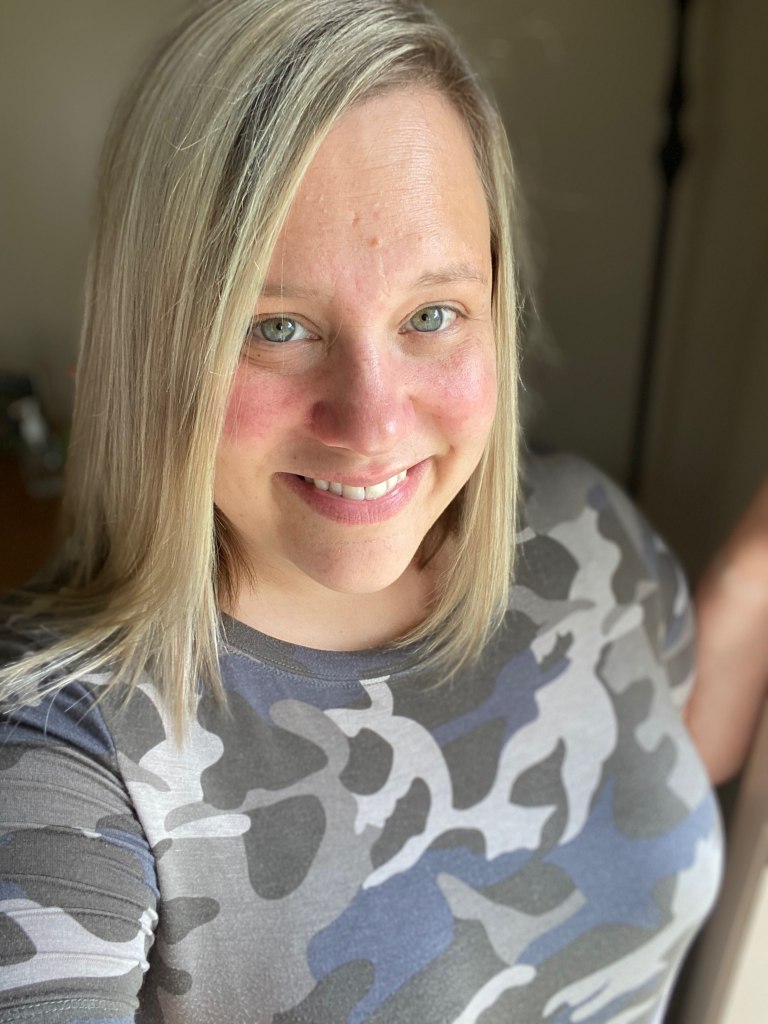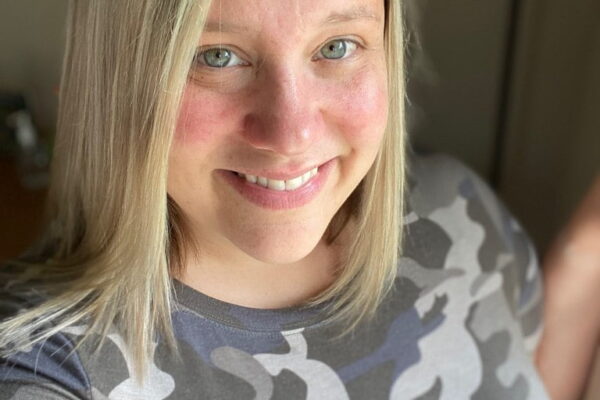- Who are you?

I’m Chrissy Smith. I’m a licensed clinical social worker, and I’m a mom, and a wife, and that about sums it up. I have a Bachelor’s in Social Work from Bradley University with a minor in Psychology. I have a Master’s in Social Work with a focus on Community Behavioral Health from the University of Illinois in Champaign-Urbana.
- What do you do professionally?
I work for UnityPoint Health – Unity Place and I’m the manager of all substance use outpatient programs for UnityPlace. That includes specialty courts, and medication addiction treatments – opioid methadone program, buprenorphine clinics, and naltrexone. We also have a naloxone distribution grant that covers about 40 counties in the state of Illinois for drug prevention and overdose prevention. We have trained and distributed thousands of naloxone kits. It’s been a cool thing. We have some leave-behind programs with some jails and prisons and fire departments and police. It’s pretty cool. They’re doing some good stuff.
- Do you have any personal interest in addiction and recovery that you’d like to share?
I think if you would have asked me this question 17 years ago when I first got in the field I would have said, “No, I don’t think I have any kind of personal relationship with substance use. I just am drawn to it.” As I’ve kind of matured as an individual, and as a professional in the field, I think like many other people, of course I have personal experience with substance use and people who I love that have struggled with substance use. And people who I love that are caught up in the opioid epidemic, and that you would have never guess would have used opiates, but did. At this point in my life, yeah sure, I have people that I love and care about that struggle with addiction and are looking to figure out recovery. But I wouldn’t have probably said that when I first started.
- Tell us about your professional experience in the area of addiction and recovery.
So, I started in the area of addiction and recovery 17 years ago as a Bachelor’s-level intern at a women’s long-term addiction treatment facility. From there I did some outpatient programming, ran some groups, did some individual sessions and then worked my way into leadership of those programs, including justice programs as they apply to substance use, and some of our contracts around that. I did some private practice for a handful of years specializing in substance use. And then about 7 years ago I began my work with the opioid epidemic, and did primarily that until just recently when I took over all of the outpatient programming for UnityPlace. But my experience and my specialty for the last 10 or so years has been the opioid epidemic.
- What are you most proud of?
You know, what I think I’m most proud of, probably, is my work in the community around awareness and stigma. It’s been some of the most challenging work that I’ve done. When I took over a methadone program – there are a lot of people who have a lot of different beliefs about the use of medications for the treatment of addiction. And so, when the opioid epidemic happened, we got a lot of push-back and a lot of misunderstanding about what that was. And I think I’m most proud of all the community events I’ve attended, speeches I’ve given on awareness, challenges I’ve had discouraging the stigma around it with professionals and families. I get super passionate about being a voice for people who haven’t been heard. And so I think that’s the thing I’m probably most proud of.
- What keeps you working in addiction and recovery?
Until there is a day where people don’t need me to be a voice for them, then I still need to be working. Right? Because I think that there still needs to be advocates in this field and advocates for the people we serve, and people that can be a voice for addiction and recovery. And you know there’s nothing like seeing some of the change that happens in this field. It’s very rewarding. Not everybody says, when they go to work, they saved a life. But there are definitely days where I know for sure I went to work and because of that a life was saved. And that’s super rewarding. And not only that, but I feel obligated to the people that I love. We know that addiction and recovery can impact all kinds of people. And so, my family and my friends aren’t immune to that. And so by staying in the field I think that I am making an impact on my direct life as well as my community.
- How has the pandemic affected your work?
I think the number one thing is safety. We work for a program where working from home was not an option. Where a lot of people had the opportunity to shelter in place, and work from home, , we didn’t have that luxury, because methadone clinics run 365 days a year no matter what. A virus didn’t stop people’s need for treatment, right? So, we have been working full time and are sometimes very nervous and fearful about what that means for not only us but for the people we’re serving. Because when the pandemic first happened everyone was told to shelter in place. Well, that wasn’t really what we could do. So, we had to work really closely with UnityPoint Health and with our clients so we could do so safely. And what I found was that takes a lot more education than you would think, right? You and I probably watch the news and have a sense of what’s going on and in the nation, and what kinds of things we can do to keep ourselves safe. We’ll read articles to do that. It took a lot of education and still takes a lot of education with the people we’re serving just on how to keep them and ourselves safe. As a clinician I’ve had to learn how to practice with a mask on, and a face shield, and other protective barriers. You know, facial expressions and non-verbals are a thing that we cherish in our field. And when you can’t see someone’s facial expressions that’s a challenge. I think that’s probably the biggest thing.
- What effects of the pandemic are you observing in the people you serve?
You know, I think there’s probably been some good and bad. So you may or may not know this – that the DEA, when this all happened, in an effort to kind of minimize the amount of movement people had to do, the DEA and Federal government modified some of the guidelines that are in place for medication addiction treatment. And so that has been good for some people. So what we have found is that some people when given a little more freedom with their medication have actually done really well. They have learned to manage their medication. Sometimes the environment – the clinic – has been stressful during the pandemic, and so not having to come to that has given them the opportunity to keep themselves safe and shelter in place more. And so that’s been good. The flip side of that is some people are really struggling.
- What, if any, long term effects do you anticipate on the field?
We have seen increased rates of substance use through toxicology testing. According to data collected from our local coroner, our rates of overdose have increased again even with the amount of naloxone we have in this area and overdose prevention education. I think that people are experiencing repeated trauma dealing with this pandemic and all the stressors that come with it. So I think we’ll see an increased need in people to process all of that. According to an article written by SAMHSA titled “Intimate Partner Violence and Child Abuse Considerations During COVID19” there is an increase in violence and abuse. We know mental health symptoms and suicide are both things that have been increasing and those are all things that directly impact our field*.
* Czeisler MÉ , Lane RI, Petrosky E, et al. Mental Health, Substance Use, and Suicidal Ideation During the COVID-19 Pandemic — United States, June 24–30, 2020. MMWR Morb Mortal Wkly Rep 2020;69:1049–1057.
- Have you seen any benefits or new opportunities in the pandemic?
I think it’s been a good opportunity for us to review some of those Federal guidelines in methadone, especially around take-home privileges. For people that aren’t familiar, there are Federal guidelines around how we do methadone and how much methadone a person can have with them at certain parts of their treatment. And those guidelines haven’t really been adjusted in a long time. And as they loosened on some of those guidelines for individuals, with still some discretion, we’ve seen some success. You know, one of the barriers with methadone is that you have to come every day. And there’s not a lot of people who can drop everything that they’re doing and come to a clinic every single day without some repercussions. So I really think that’s an opportunity and there’s a benefit in that, and something we can look at in allowing folks to have a little more privilege with their medication. I think really we’ve had a good opportunity to connect with people, too, during the pandemic. So, because of the need for education we were forced, or given the opportunity, to take more time with people. Just spend more time talking with and helping people – just in that area. And it’s been cool. We’ve really built kind of a community and a connection around that because we’re all going through it together.
- If you were able to work on a fantasy project to improve treatment and recovery support, what would it be?
I think I have 3 things. The one thing that I wish that every program could have, if budget wasn’t a concern, was recovery coaching. I think recovery coaching for MAT is huge and not all programs put that into their budget. But we know that recovery coaches are super-beneficial. I wish that we could put a couple of recovery coaches in every MAT program. I wish that we could do better with on-demand treatment. I wish if somebody presented to a hospital or doctor’s office or ER or my front door we could start them right there and right then. But not always do programs have access to that kind of treatment and the guidelines aren’t really set up for that, unless you have a doctor on-site and available that moment. So in a perfect world I would love to see that. I would also love to see a better way to follow up with people post- discharge from treatment. Whether that was an administrative discharge, or successful completion – in our field we don’t really have a great way to follow up with people post-treatment. And I wish we could figure that out better.
This interview was conducted on 10/12/2020.
